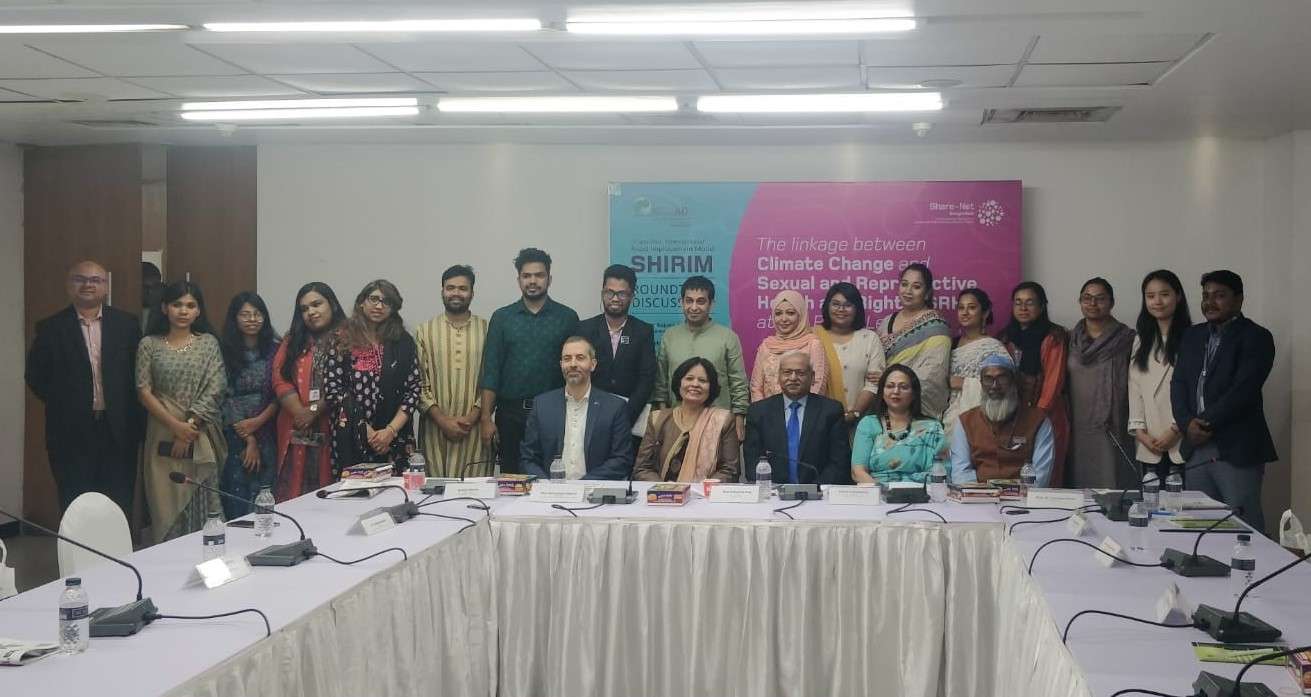SHIRIM Roundtable Discussion: The Linkage Between Climate Change and SRHR at the Policy Level
In association with International Center for Climate Change and Development (ICCCAD) and Red Orange Communications, Share-Net Bangladesh jointly organised SHIRIM Roundtable Discussion: The Linkage Between Climate Change and SRHR at the Policy Level. with Dhaka Tribune at the Krishibid Institute Bangladesh.
It was an assembly of climate change and SRHR enthusiasts who contributed to an impactful discussion on the issue. Kazi Zebunnesa Begum, Additional Secretary (WH Wing), Health Service Division, Ministry of Health and Family Welfare was present as Chief Guest. Daniel Novak, First Secretary (Health)/Program Specialist-SIDA, Embassy of Sweden and Prof. Dr Tahmina Shirin Director, Institute of Epidemiology, Disease Control and Research, IEDCR present as special guests. The roundtable discussion was chaired by Prof Saleemul Huq, Director (ICCCAD). Mr Arnob Chakrabarty, Managing Director, RedOrange Communications moderated the session. With a short brief of the roundtable and a round of introduction, the discussion commenced.
As a keynote presenter, Dr Nazneen I. Khan Researcher, ICCCAD, presented the policy brief where she stated the impacts of climate disasters and their impact on local people increasingly determined by health, economic, and security inequalities. For the Bangladesh context, the issue is crucial as there is inadequate access to SRHR services which increases women’s risk of physical, mental and psychological harm.
Tasnia Ahmed, Programme Manager, Serac Bangladesh, presented a desk review explaining the present condition of SRHR in Bangladesh. Alarming insights are; inaccessibility of SRHR services in climate-affected areas for women and adolescents, the lack of SRH products, and the intersectional effects of climate change resulting in SGBV. Through her presentation, she presented a list of government and non-government organizations who is working for the welfare of adolescent girls with SRH knowledge and products and suggested that the implementation needs to be evaluated and monitored for sustainability.
Honourable Chief Guest Kazi Zebunnesa Begum, Additional Secretary (WH Wing), Health Service Division, Ministry of Health and Family Welfare emphasized prioritizing issues to effectively work on. She shared how women are day-to-day neglected knowingly or unknowingly, and how they are not supported by their partners and family members. “There are no issues with the budget, enough budget is available, but we need to address the needful gender topics to work on.”She added.
In his concluding speech, the Director of ICCCAD, Dr Saleemul Huq remarked on three points from the discussion- i) climate change is a nexus term and it needs to be coordinated with agriculture, health, gender, and women, ii) a clear distribution of responsibility and iii) role of individuals needs to be assigned and focusing on youth as leaders will bring success in addressing the linkage between climate change and SRHR.
In the session, Share-net Bangladesh and the members of different concerned stakeholders and experts addressed the intersectionality of Climate Change and SRHR and translated the existing evidence, knowledge, and research on this topic for policymakers. Mushfiqua Zaman Satiar, Senior Policy Adviser (SRHR and Gender), Embassy of the Kingdom of the Netherlands in Bangladesh; Daniel Novak, First Secretary – Health Sector, Embassy of Sweden; Professor Dr. Halida Hanum Aktar, Senior Associate, John Hopkins Bloomberg School of Public Health, Md. Azmal Hossain, MSS, MPH, MScPH, Programme Analyst-Urban Health, UNFPA Bangladesh; Masuma Billah, Head of Programme, BRAC Gender Justice Department were honourable guest speakers at the roundtable. They agreed and highly recommended that climate change has a negative impact on women and girls.
Other speakers from Pathfinder, Friendship, and Youthnet were present and contributed to the discussions.

